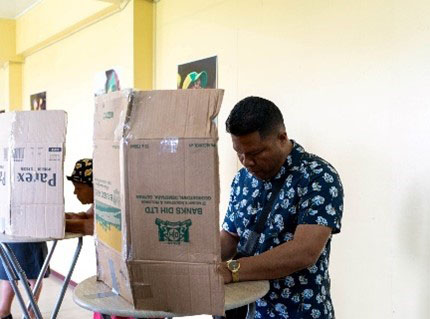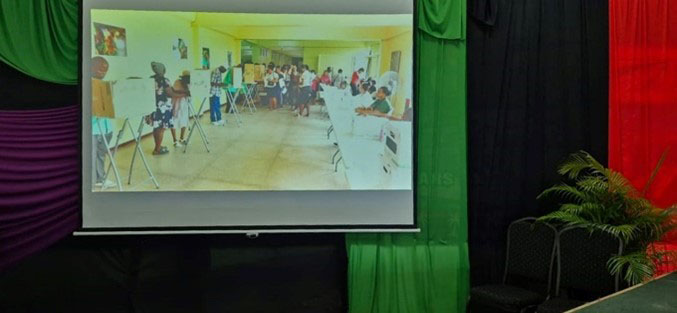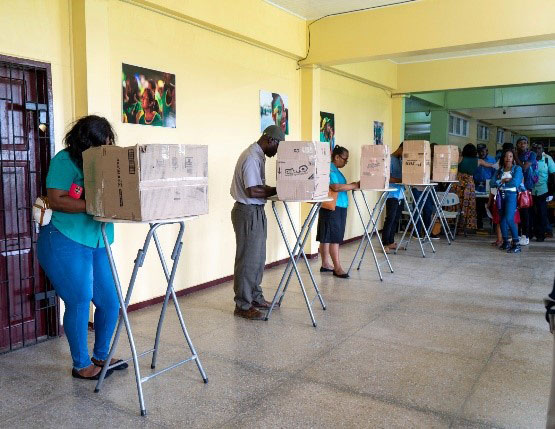By Khadidjah Ba
Two days after a controversial 22nd Biennial Con-gress, re-elected him, PNCR Leader Aubrey Norton on Tuesday told Stabroek News that any consensus presidential candidate representing the opposition next year will have to come from within the party.
Norton emphasized inclusivity of all persons within the People’s National Congress Reform (PNCR) in the selection of a consensus presidential candidate.
“I wouldn’t close the door to anyone,” he stated. He likened the party’s dominant position within the current A Partnership for National Unity (APNU) coalition to a majority shareholder in a business, advocating for the PNCR’s right to lead based on its extensive grassroots support and organizational efforts. Sections of APNU have said that they conducted new elections and replaced Norton but the PNCR Leader has rejected this.
When asked about his consideration of the AFC’s newly elected Leader, Nigel Hughes as a possible Consensus Candidate, Norton said “The PNCR is the largest party in the coalition, and I don’t know that in a business if you have 90% of the shares you allow people with 10% of the shares to be in charge of the business. And so, I think that the PNCR members have worked hard, they have been rebuilding and resharing the party’s popularity and it is only right that the PNCR exercises that right to be the Presidential candidate.”
 The Congress passed a motion decreeing that the elected Party Leader at the 22nd Biennial Delegates Congress be the Party’s Presidential Candidate for the next General and Regional elections The motion however said that the PNCR leader “is solely empowered to decide, if he or she so chooses, on other possible choices or arrangements for Presidential Candidate”.
The Congress passed a motion decreeing that the elected Party Leader at the 22nd Biennial Delegates Congress be the Party’s Presidential Candidate for the next General and Regional elections The motion however said that the PNCR leader “is solely empowered to decide, if he or she so chooses, on other possible choices or arrangements for Presidential Candidate”.
Norton on Tuesday addressed concerns with SN regarding the delayed announcement of the election of 15 Central Execu-tive Committee (CEC) members, pointing to the meticulous nature of the process.
“We have more than 100 nominees and the team is presently counting [the ballots] with the scrutineers; this is a tedious process,” he remarked. He went on to explain that this emphasis on transparency is crucial, especially in ensuring that every step of the Congress reflects the democratic values the party stands for.
Speaking on the Party’s internal controversies leading up to the Congress, Norton expressed confidence in the party’s organizational capabilities. “‘I always knew that as a Party we are organized and we are going to put everything in place to ensure we have a proper Congress,” he affirmed.

The use of cameras during voting was highlighted as a measure to uphold transparency, allowing all attendees to witness the fairness of the proceedings firsthand.
General Secretary Dawn Hastings-Williams resigned with immediate effect on June 24, just days before the June 28 to 30 Congress. Addressing the imminent replacement of the General Secretary, Norton assured on Tuesday that deliberations were underway. ‘I have been discussing and engaging with people and I believe shortly we will have an announcement on who the General Secretary of the Party is,” he disclosed to SN.
In her resignation letter, Hastings-Williams detailed a range of issues, including the “inadequate” one-month preparation period for the Congress, which she feared could lead to confusion rather than a fair and transparent process. Her concerns were echoed by others.
Hastings-Williams cited several obstacles that hindered the accurate compilation of a general membership list. These included unauthorized removal of a Central Processing Unit from the department, causing a two-week delay. She also mentioned discrepancies between Secretariat records and submissions from party members, questioning the accuracy of the membership register. Financial matters and other incidents further compounded her decision.

This issue added to a series of challenges Norton has faced, including withdrawals by leadership contenders Amanda Walton-Desir and Roysdale Forde SC, both citing irregularities in the election process.
Walton-Desir highlighted concerns over procedural disagreements among candidates and the lack of a delegate list for claims and objections. Forde, meanwhile, criticized the Central Executive Committee and the General Secretary for failing to address concerns over electoral integrity, citing irregularities in the delegate list and unreasonable timelines for the Congress. His decision, he stressed, was rooted in principles of accountability, transparency, and democratic governance crucial to the party’s electoral integrity.
In the lead-up to the Congress, Norton also faced allegations of sexual harassment from party member Vanessa Kissoon, currently under investigation by a group of party elders.





